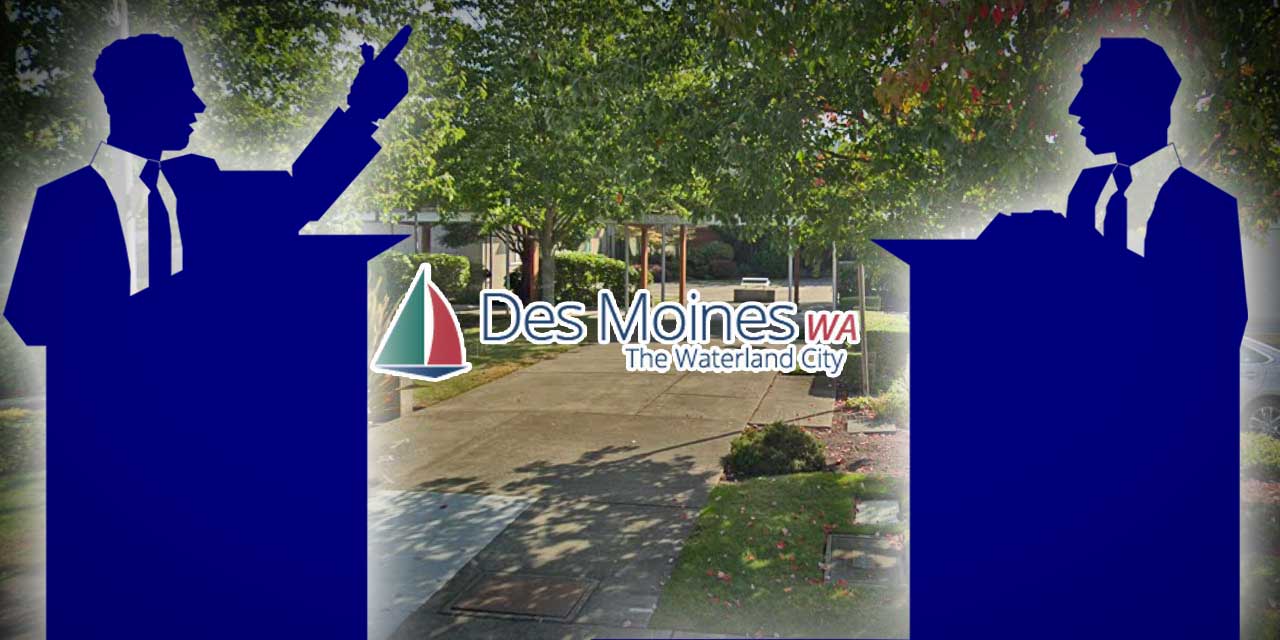EDITOR’S NOTE: The following is Part 2 of a response to the City of Des Moines 2021 “State of the City” address given on April 15, 2021, written by Councilmembers JC Harris and Anthony Martinelli:
Response To The State of the City Part 2 (Policy)
by Councilmembers JC Harris and Anthony Martinelli
This is the second half of our response to the April 15th State Of The City presentation. Part 1 discussed our objections to the way it was carried out. Here we’ll talk about some specific policy differences. For those of you short on time, you can follow along with this presentation packet.
As noted last time, one of the many ways the presentation was unusual was the fact that our colleagues were also presenters! That risks making our comments sound personal. We can also hear howls that we are somehow criticizing our great staff. Neither could be further from the truth. This is about policy, which is set by the Council and City Manager. The discussion stops there.
The big picture
Over the years, the number of Des Moines residents hasn’t changed much, but the composition has. Most notably, we are now younger and more diverse. Also, remember that the original City was very small and the current town is actually the result of many small annexations. But the majority of services and programs are still focused around that original core.
The City must recognize these changes and adapt to better address the needs of residents in all neighborhoods.
Challenges
In Part 1, we stated that the presentation was ‘all positive and no negative’ but at first glance a few slides imply otherwise. For example, Slide #6 showed an assessment of the City from a 1962 report outlining many of problems we still see today.
But far from (finally) offering some solutions, the message seemed to be that we just have to learn to live with most of these structural problems. We disagree. Most of these challenges come down to choices as much as ‘fate’. Governments decide which issues to tackle aggressively–and which to avoid.
The Past 5 Years
As Slide #7 states, the City is now on much better financial footing than after the 2008 financial crisis and our credit rating is now solidly competitive with comparable cities.
But what the presentation referred to as ‘diversified revenue streams’ actually means strategies like raising your utility taxes to the highest allowable rates. This disproportionately affects low and middle income residents and turns away businesses.
Balancing the books shows operational skills (good), but it does not automatically signal a long term strategy that benefits you or business.
Marina Redevelopment
The Marina discussion is being driven by the fact that the docks are at their end of life. This will be the largest and longest capital project in our history. But there is a separate discussion concerning the land side which is, unfortunately, being sold together as a ‘package deal’ and that is wrong.
To be clear: the Marina docks do require replacement and that work (and that work alone) should begin now.
In 2017, the City installed a highly flawed paid parking system despite ongoing public opposition. That same year the administration held a single open house to gather public input on land side redevelopment. Four years ago. Last month, City Currents Magazine published a highly misleading editorial about passenger ferry service–with no vote or presentation to Council. And this month, the City finally unveiled its Marina redevelopment proposals, which appear identical to the renderings shown at that 2017 open house.
There is a pattern here: of poor public engagement, questionable decision-making and no transparency. The current majority is using the legitimate urgency of dock replacement to rush through a land side development with inadequate information, oversight or public buy-in.
The City should engage an independent professional to review any land side plans before moving ahead. We at least deserve a second opinion to confirm that we are headed in the right direction on such a large decision.
Economic Development
We are always happy to see new businesses in Des Moines. However, the essential challenges to the downtown and to all our business community are still not being addressed. Frankly, we have watched many small shops come and go over the decades and very few have been sticky. Almost none have leveraged more visitors to Des Moines.
We also appreciate the continued investment in Des Moines by Wesley and we look forward to their continued partnership. At the same time, the City should be focusing economic development efforts far more on our increasingly youthful population.
We were far ahead of our colleagues in advocating for business grants at the start of the pandemic. The City responded too slowly, finally offering a program with no independent oversight. We gave over $500,000 to only 26 businesses located almost exclusively in our downtown. In fact there were hundreds of businesses throughout Des Moines completely unaware of the program. That was not only unfair and unethical, it’s just bad for business. All future business grant programs should be run independently.
Transportation
One thing to understand about transportation spending in Des Moines is how little of it there actually is. Almost all road improvements comes from highly competitive regional grants, currently limiting us to only one or two projects every few years. It may seem obvious, but the two best ways to fund more projects are to improve the business environment and increase our presence in regional government.
The Community Connections Shuttle was a wonderful addition to Des Moines–five years ago. However, the majority of residents who need transit live in other areas–where services are poorest. We urgently need another such shuttle and we need much stronger advocacy for transit throughout the City.
Public Safety
We fully support our police department. In fact, we’d like to see more police deployed in your neighborhood. Although the administration refers to our department as ‘fully staffed’, the number of officers is now far smaller than in 2007.
We applaud the administration’s vocal support for police reform–such as adopting the #8Can’tWait campaign. However a recent letter of resignation from one member of the Diversity Advisory Committee raises concerns as to the City’s true commitment.
Parks, Recreation, Senior Services
The City groups several very important (and very different!) functions into one block called ‘human services’ and these are all undervalued. $175,000 out of a $24.5 million dollar general fund is simply not adequate–especially during a pandemic. Programs serving kids, seniors, families and people with special needs should never be outsourced.
We also acknowledge the recent work the City has done to improve places like Midway Park. But it is important to note that these upgrades began only after great volunteers laid the foundation. Currently, volunteerism for all City-related groups is at an all time low. We must do more to reverse that trend–including making the process much easier. It is volunteers who do so much to keep Des Moines running.
The Masonic Home
The Masonic Home is one of the most historically significant buildings in the entire state and has tremendous strategic potential. Yes, it has been problematic for years, but repeatedly the City chose to leave its fate to private developers–as if it were just another building. If and when a new opportunity appears we should be ready to provide every resource to support its rebirth as an economic engine for South Des Moines.
Sea-Tac Airport
The airport has been and will continue to be the single biggest threat to the City and its residents, having contributed to declines in our schools, property values and the health of our residents. Despite the public perception, very little of the airport’s money or well-paid jobs are in Des Moines.
The City has repeatedly made this situation worse for residents, publicly bemoaning the noise and pollution, while supporting the Port’s agenda in policy. Our Airport Advisory Committee resigned last year in frustration.
With little fanfare, Sea-Tac will soon begin a new expansion referred to as the SAMP. Unless vigorously opposed, this will add tens of thousands of flights over Des Moines.
There is a great deal we can do to improve this situation, but we must change our approach immediately.
In closing
This message is firm because the circumstances demand it. However it includes not only constructive criticisms but also solutions for improving our government and making your City better. In a letter like this, it is impossible to go into detail. But we welcome discussion of those details with both our colleagues and the public. It is offered to our colleagues and to all residents of Des Moines with sincerity and with absolutely no rancor.
It is our honor to serve Des Moines.
Councilmember JC Harris,
Councilmember Anthony Martinelli



Good that you finally provided a response to the Mayors State of the City address. Too bad you wasted your first opportunity to state your views, but instead chose to sound like a couple of disgruntled whiners. It makes it hard to listen to you ideas when your initial reponse was to show poor judgment in the use of your, and our, time to make it know how you “felt” about the address instead of discussing the issues. I may agree, and understand and not agree, with some of your points, but it is hard to take seriously your views given your initial response.